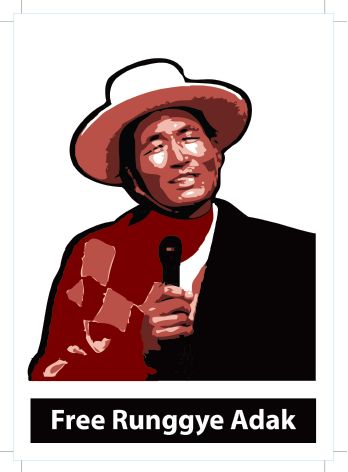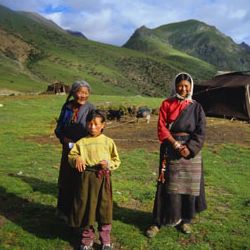The footage obtained by the International Campaign for Tibet (ICT) and translated by the International Tibet Support Network (ITSN) shows an excerpt of Runggye Adak’s speech onstage at the popular Lithang Horse Racing Festival on 1 August 2007 in Lithang, Kardze (Chinese: Ganzi) Tibetan Autonomous Prefecture in eastern Tibet (Sichuan). He was arrested  by Chinese police minutes after taking the stage.
by Chinese police minutes after taking the stage.
Tibetans need Dalai Lama
A transcript of the footage, which provides a rare glimpse of political protest inside Tibet, reads: “These things have happened to us; did you hear what has happened to us? Although we can move our bodies, we cannot express what is in our hearts. You know? These days there are those who say we don’t need the Dalai Lama. The Dalai Lama is the one that we six million Tibetans truly [need].”
See the video footage here (subtitled) and here (raw, longer).
Eyewitnesses have confirmed that Runggye Adak refuted the claim that Tibetans do not need the Dalai Lama.
Runggye Adak’s son Jamyang Lobsang, aged 25, who recently escaped from Tibet to India has made a heartfelt appeal for the release of his father, who is in declining health. “My father, Runggye Adak is innocent. What he said is true and represents the wishes and aspirations of Tibetans inside Tibet.”
Demand to release political prisoners
Relatives of Runggye Adak, a 55-year-old father of eleven, reported that he also called for religious freedom in Tibet and for the release of political prisoners, including the Panchen Lama and Tenzin Delek Rinpoche, as a crowd of thousands of Tibetans cheered in response.
“This powerful footage shows Runggye Adak expressing the true aspirations of Tibetans inside Tibet to be reunited with their leader. Three years on, his conviction and courageous action continue to inspire Tibetans everywhere.” said Dhardon Sharling of Tibetan Women’s Association, which is part of the International Tibet Support Network’s Political Prisoner Campaign Working Group.
“There is a growing movement inside Tibet of Tibetans – like Runggye Adak – defying China’s restrictions and boldly asserting their identity and beliefs. The Chinese government can arrest and imprison individuals, but they cannot silence Tibetans’ voices.
Reverse effect
By imprisoning Runggye Adak, Beijing has ironically helped to amplify his message for Tibet to the world and we call o n the international community and our government leaders to actively press the People´s Republic of China for his release,” said Tenzin Dorjee, Executive Director of Students for a Free Tibet.
n the international community and our government leaders to actively press the People´s Republic of China for his release,” said Tenzin Dorjee, Executive Director of Students for a Free Tibet.
Just months after Runggye Adak’s speech in August 2007, hundreds of protests broke out across the Tibetan plateau as Tibetans openly defied Chinese rule and called for, amongst other things, the Dalai Lama’s return.
Chinese forces responded with extreme violence, shooting indiscriminately at crowds, detaining thousands, and flooding Tibet with armed troops.
Enhanced propaganda
Since March 2008, the Chinese government has stepped up its propaganda against the Dalai Lama and renewed its patriotic re-education campaign in Tibet, which requires Tibetans to denounce the Dalai Lama.
“The Chinese government’s draconian policies criminalizing people’s devotion to the Dalai Lama have only served to strengthen Tibetans’ loyalty to him as their spiritual and temporal leader,” said Ngawang Woeber, President of Gu Chu Sum Political Prisoners Movement. “We call on the People´s Republic of China to immediately release Runggye Adak and other Tibetan prisoners of conscience.
The Chinese authorities described Runggye Adak’s speech as a “major political incident” and charged him with “provocation to subvert state power”.
During his trial, the judge stated that by calling for the Dalai Lama’s return, Adak had “committed the crime of subverting the People’s Republic of China.” In response, Runggye Adak told the court, “I wanted His Holiness to return, and I wanted to raise Tibetan concerns and grievances, as there is no outlet for us to do so. That made me sad and made me act.”
Gathering dispersed, relatives sentenced
Following Runggye Adak’s arrest, over 200 Tibetans congregated outside the Lithang police station to appeal for his release. Eye-witness reports describe how Chinese police and soldiers violently dispersed local gatherings by using tear gas, stun grenades and metal batons.
Several Tibetans close to Runggye Adak were also arrested, including his nephew Adak Lopoe and Jamyang Kunkhyen, who are serving prison sentences of 10 years and 9 years respectively, for informing foreign media about Runggye Adak’s courageous speech.
R unggye Adak’s family has only been allowed to visit him in Mianyang prison once, after 50 Tibetans filed a request to local officials. He suffers from stomach ailments and loss of eyesight.
unggye Adak’s family has only been allowed to visit him in Mianyang prison once, after 50 Tibetans filed a request to local officials. He suffers from stomach ailments and loss of eyesight.
Take action here.
Imprisoned for leaflets
Chinese authorities continue to suppress local political initiatives in Tibet. On 30 July 2010 Chinese authorities in Sertha County sentenced 2 Tibetans to two and half years’ imprisonment, according to the Voice of Tibet radio service. Kalden and Sonam Topden were arrested on May 16 this year.
Chinese police nabbed them as they were pasting leaflets containing demands for Tibetan freedom and return of the Dalai Lama. The duo had thrown hundreds of leaflets into the air before getting arrested.
Two other Tibetans, Galug and Wangchuk, from Jomda County in Dege were sentenced to varying prison terms for defying Chinese government orders to till their land.
Galuk received one and half years of imprisonment while Wangchuk got a year’s prison term.
It appears that the two were among the eight Tibetans arrested in October last year in Jomda County by authorities for defying Chinese government orders to start farming activities.
Tibetan farmers in eastern Tibet had defiantly undertaken a “Farming Boycott Movement” to protest against China’s repressive measures following the crackdown on Tibetan protesters in other parts of Tibet.
HRH Oslo, based on Students for Free Tibet and Phayul.com information.
Related links:
Chinese court rejects appeal from Tibetan environmentalist
Prosecution of environmentalists: China rocking its own boat





